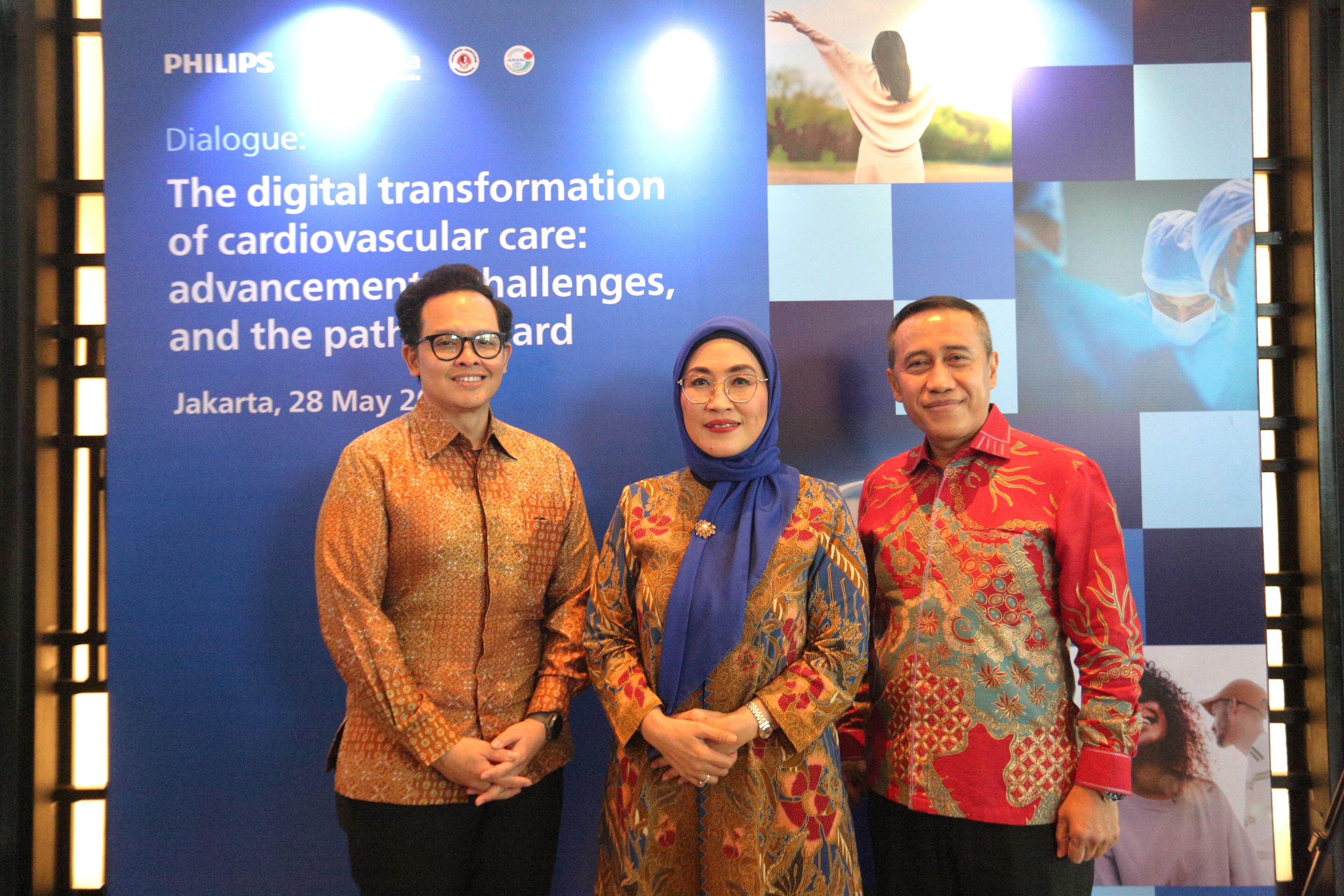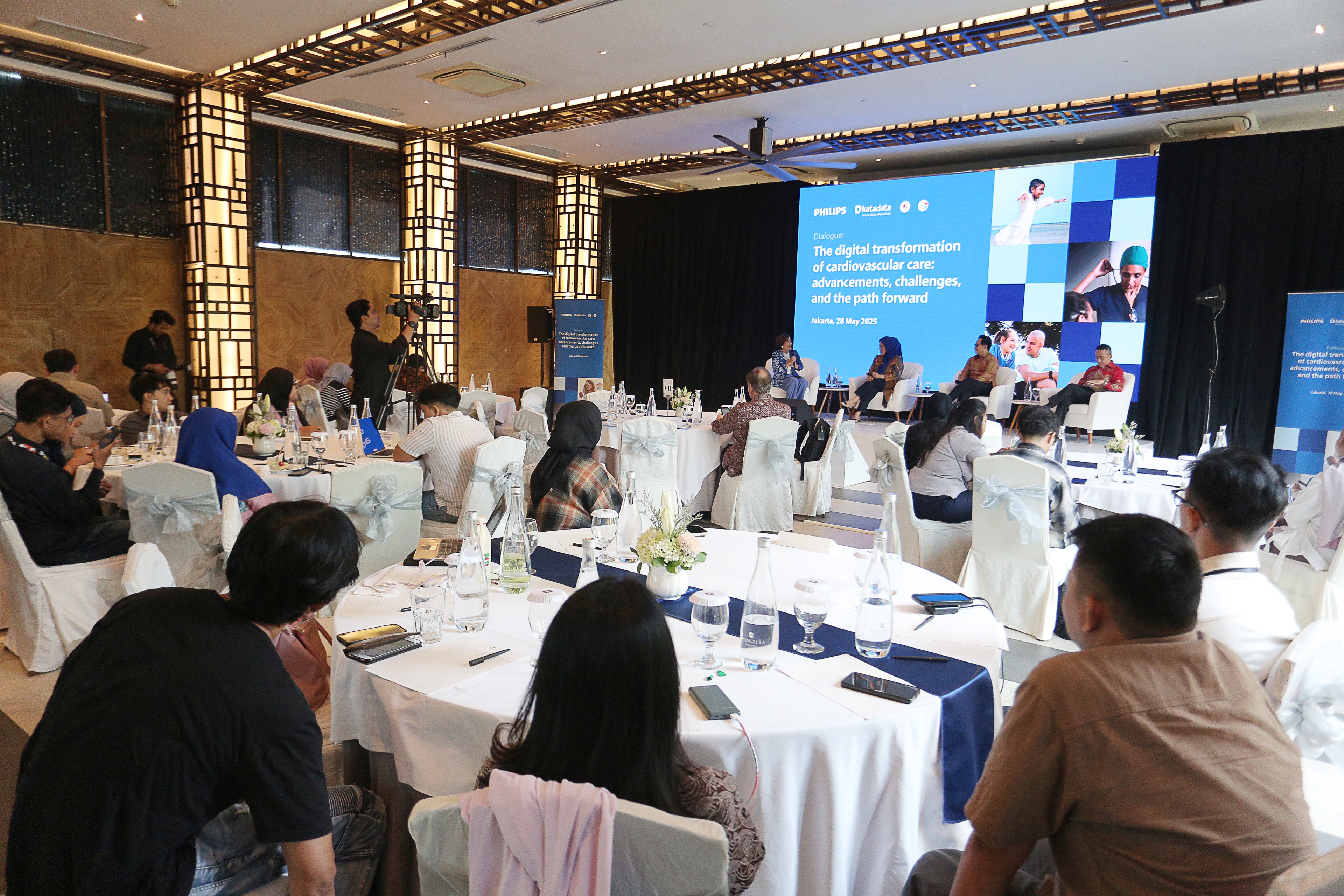Jun 03, 2025
Philips and stakeholders call for wider adoption of advanced technologies to deliver better heart care for all in Indonesia
Advanced healthcare technologies, such as Al-powered imaging, treatment and monitoring technologies, are key enablers to deliver better cardiac care amid a shortage of cardiologists.
Jakarta, Indonesia – Royal Philips (NYSE: PHG, AEX: PHIA), a global health technology leader, the Indonesian Heart Foundation (YJI) and Indonesian Private Hospitals Association (ARSSI) today spotlight that accelerating healthcare innovation and the adoption of advanced healthcare technologies, such as AI-powered imaging, treatment and monitoring technologies are urgent priorities to tackle Indonesia’s rising cardiovascular disease burden.
Speaking at a multi-stakeholder dialogue titled, “The digital transformation of cardiovascular care: advancements, challenges and the path forward”, they laid out plans to harness innovation and technologies for better, faster and more accessible cardiovascular care amid a shortage of healthcare professionals. The dialogue took place at the Shangri-La Hotel Jakarta and was attended by leading national media outlets.
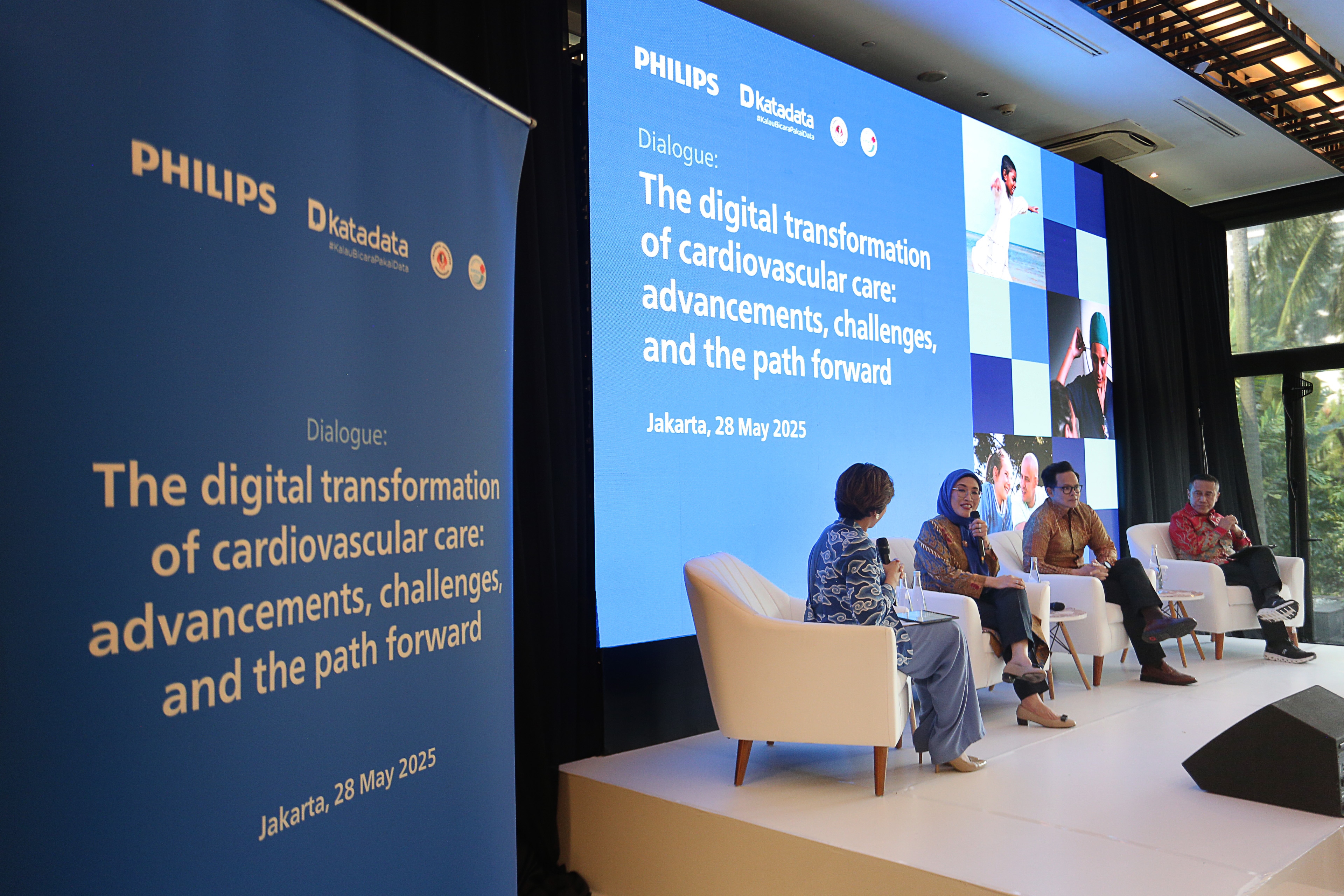
A growing cardiovascular disease burden
Cardiovascular disease is a significant health challenge in Indonesia. About 650,000 people are diagnosed every year [1] and it is the leading cause of death in Indonesia. [2] Heart disease alone places a financial burden of 10.3 trillion rupiah, or over US$700 million, on the healthcare system annually. [3]
This strain is further exacerbated by a shortage of cardiologists and healthcare facilities across Indonesia’s 17,000 islands which hampers patients’ ability to receive timely care. There are only around 1,500 cardiologists in the entire country and hospitals which can deliver advanced care are mostly based in major cities, leaving rural communities underserved. [4]
Insufficient access to cardiologists and comprehensive cardiac diagnostic tools in several regions of Indonesia remains a key barrier, often causing significant delays in timely diagnosis and treatment. This makes heart disease much harder to manage when patients reach us, as their conditions are more advanced.”
dr. BRM. Ario Soeryo Kuncoro, Sp.JP(K), FIHA, FAsCC
Head of the Medical Division at the Indonesian Heart Foundation (YJI) and a cardiologist at Harapan Kita Hospital
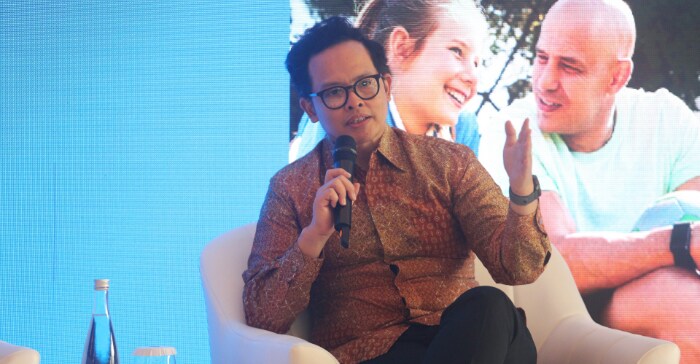
Beyond the shortage of specialists, healthcare facilities in underserved areas often lack the resources to manage cardiovascular conditions effectively. These systemic challenges create significant gaps in care and contribute to the growing disease burden nationwide.
Cardiovascular disease patients are getting younger
Heart disease is no longer confined to older adults. More young Indonesians, even those in their 20s and 30s, are being diagnosed. [5]
“Cardiovascular disease is now affecting younger adults at the prime of their lives. This prevents them and their loved ones from focusing on their livelihoods as they adjust to a lifetime of managing the condition,” said dr. Ario. “It is critical that we accelerate disease awareness, promote prevention, and drive early detection and treatment. Catching it early is the best way to reduce complications and alleviate the healthcare strain in Indonesia,” he added.
drg. Iing Ichsan Hanafi, MARS., MH, Chairman of the Indonesian Private Hospital Association (ARSSI) also underscored this matter. "The growing number of younger patients with heart disease is a wake-up call for all hospitals. We must strengthen our readiness — not just in treatment, but also in early detection and preventive care. Our focus needs to shift towards delivering faster, more proactive, and patient-centered services across all age groups,” he stated.
Urgent need for advanced health technologies to bridge care gaps
All stakeholders agreed that AI-powered imaging, treatment and monitoring, as well as better integration of patient data across healthcare settings will bridge critical care gaps. These, combined with AI-driven virtual care technologies, will enable local healthcare providers to deliver faster, more effective care, even in rural and resource-constrained settings. Healthcare leaders are already planning to incorporate such technologies. According to the Philips Future Health Index 2024, 74% of healthcare leaders in Indonesia plan to invest in generative AI in the next three years – well above the global average of 56%. [6]
“What really helps us work faster and smarter is when we have the right solutions. These streamline workflows enhance the speed of diagnosis, and support decision-making. This means patients can be diagnosed faster, treated earlier, and better outcomes achieved. As a whole, hospitals can treat more patients, which makes a huge difference in settings with limited resources,” added dr. Ario.
AI and digital technologies are pivotal in closing the cardiovascular gaps in Indonesia. By being at the forefront of digital transformation and investing in innovation and advanced healthcare technologies, the private hospital sector will continue to contribute to the present and future needs of cardiovascular patients and support Indonesia in building more efficient healthcare system.”
drg. Iing Ichsan Hanafi, MARS., MH
Chairman of the Indonesian Private Hospital Association (ARSSI)
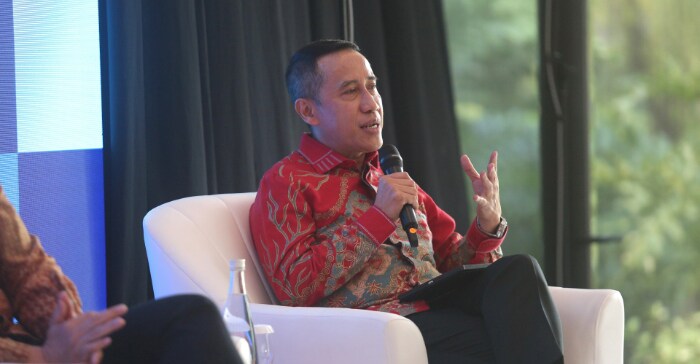
Philips’ commitment to deliver better care for more people
Philips is working with healthcare providers to improve productivity and workflow across the entire care journey. AI-powered imaging solutions, such as cardiac ultrasound, CT and MRI, are helping clinicians detect heart conditions earlier and with greater accuracy, while reducing time for diagnosis. Automated measurements and real-time insights also streamline clinical workflows and increase diagnostic confidence.
Integrated informatics platforms are supporting care for complex cardiac cases by connecting imaging and clinical data across departments. Multidisciplinary teams, from catheterization laboratories, echo, CT, to MRI, can now access a single, unified patient view to track disease progression and make faster, more informed decisions. Digital tools like remote monitoring and predictive analytics empower clinicians to manage chronic conditions proactively, reduce unnecessary hospital visits, and keep patients engaged in their own care.
Astri Ramayanti Dharmawan, President Director of Philips Indonesia said, “Indonesia’s fight against heart disease requires more than manpower – it demands innovation. With a shortage of cardiologists and a rising burden of cardiovascular disease, we need health technology solutions that enable earlier diagnosis and faster intervention. We’re committed to building a stronger and more resilient healthcare system – in line with our vision to deliver better care for more people.”
Stakeholders agreed that cutting-edge technologies must go hand-in-hand with strong public-private partnerships to accelerate Indonesia’s digital health transformation. The dialogue further serves as a catalyst to drive more collaborations to build a more efficient, effective model of cardiac care.
Digital transformation is not just about technology. It’s about working together to reimagine how care is delivered. To truly make an impact, we must ensure these innovations are accessible, scalable, and built around the needs of both clinicians and patients across Indonesia.”
Astri Ramayanti Dharmawan
President Director of Philips Indonesia
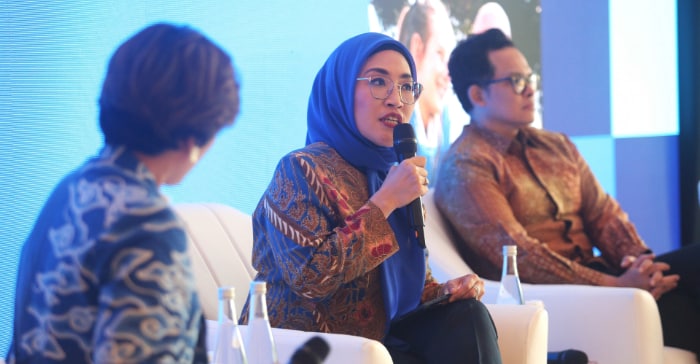
Tentang Philips
Royal Philips (NYSE: PHG, AEX: PHIA) is a leading health technology company focused on improving people's health and well-being through meaningful innovation. Philips’ patient- and people-centric innovation leverages advanced technology and deep clinical and consumer insights to deliver personal health solutions for consumers and professional health solutions for healthcare providers and their patients in the hospital and the home. Headquartered in the Netherlands, the company is a leader in diagnostic imaging, ultrasound, image-guided therapy, monitoring and enterprise informatics, as well as in personal health. Philips generated 2023 sales of EUR 18.2 billion and employs approximately 69,700 employees with sales and services in more than 100 countries. News about Philips can be found at www.philips.com/newscenter.


